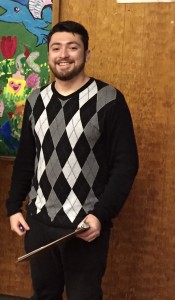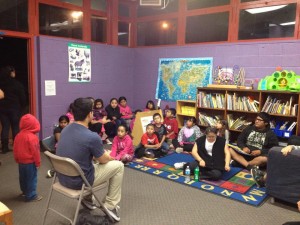At 7 p.m. on Tuesdays and Thursdays, up to 32 of Pescadero’s youngest students sit cross-legged in a circle on the floor of the school district’s multi-purpose room at the start of Homework Club. In a few moments, Puente staff members will break the group into smaller knots of children and take them into separate zones. One group will practice reading and writing, another will do art and science projects, and a third group, which is struggling with math homework, will be guided toward laptops that run a special math-tutoring program.
A few yards away, in a classroom provided by Puente, their parents are also focused on learning through Puente’s adult ESL program.
Puente’s Ivan Ortega moves among his young charges, paying special attention to whether the students sitting in front of the ten Chromebooks are in fact completing their math homework or if they need support understanding the instructions. Ortega is tracking which students are improving, and which need the most computer time. He knows them all by name, and he pushes them when they need to be pushed. This Homework Club was his brainchild, and he is all of 18 years old, a recent graduate of Pescadero High School.

Three months ago, Puente’s Homework Club consisted of five students who were struggling with math homework. The La Honda-Pescadero Unified School District uses a program called DreamBox, an online-interactive math software that helps elementary and middle school students learn while parents and teachers track their progress. Students are required to complete a certain number of modules each week, but there’s a problem – some students don’t have laptops at home, let alone access to the Web.
“It’s hard for some of the kids because they don’t have Internet access, and their parents don't understand computers and can’t help them with their math,” explains Ortega.
With the school district’s blessing and five (now 10) of its Chromebooks, Ortega began helping students complete their math homework after school. It wasn’t long before the idea caught on. Dozens of parents bring their children to Puente when they come for Adult Education, and many of those children need help with reading, writing and math.
“We have young people in our care for a lot of hours and we wanted to figure out how we could use our time with them to best make a difference,” says Kerry Lobel, Executive Director of Puente. “It's a longtime idea that took one young person to think it through.”
Ortega saw an opportunity. So did the school district which moved quickly to align the program with its School Improvement Grant program and goals as a way to boost student performance and to increase parent participation.
The district has 66 students in its well-organized K-8 after-school program. But not everyone gets as much individual attention as they do in Homework Club. And they don’t all get on DreamBox every day, says Erica Hays, Principal of Pescadero Elementary School.

Even though Homework Club only began this October, says Hays, students’ math performance is already improving. “We’re seeing a real increase in the number of kids who have access to DreamBox to get their work done, and that’s been a big boost for them,” she says.
Ironically enough, it wasn’t that long ago that Ortega was himself a student in “Miss Hays’” first-grade classroom. From the very beginning, Ortega struggled with English and hated doing his homework. He was more interested in playing with his friends than paying attention to his teachers.
“I was a troublemaker,” he says bluntly, with a laugh. “I didn't turn in my homework. I’ll be really honest. Now I’m pressuring these kids to do their homework and turn it in.”
Growing up, Ortega’s parents weren’t able to help him with his English. And his mother, who had a 6th grade education from Mexico, was unfamiliar with his math curriculum. Back then, the elementary school lacked an after-school program. He didn’t have support. “I never had anyone to keep an eye on me,” he says.
Homework Club is a full-circle moment for Ortega and several other Puente team members – former schoolmates of his who came up through the school district and are now entering college. They not only tutor the younger generation, they show them why homework is important to their futures.
“I try to motivate them. I tell them that I was in their shoes and I didn't like to do homework. But at the end of the road, it’s going to be helpful – one day they they’ll be in college, and have a job,” says Ortega.
Their first jobs may even be with Puente’s own youth employment program. As for Ortega, who was recently promoted to Homework Club supervisor, he plans to become a teacher.
For more information about volunteering for the homework club, email Abby Mohaupt.
